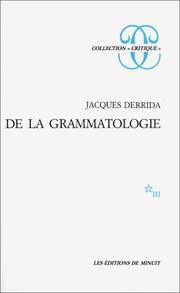Of Grammatology
Topic: Philosophy
 From HandWiki - Reading time: 4 min
From HandWiki - Reading time: 4 min
 Cover of the French edition | |
| Author | Jacques Derrida |
|---|---|
| Original title | De la grammatologie |
| Translator | Gayatri Chakravorty Spivak |
| Country | France |
| Language | French |
| Subject | Philosophy |
| Publisher | Les Éditions de Minuit |
Publication date | 1967 |
Published in English | 1976 |
| Media type | |
| Pages | 360 (revised English translation) |
| ISBN | 0-8018-5830-5 |
Of Grammatology (French: De la grammatologie) is a 1967 book by French philosopher Jacques Derrida that has been called a foundational text for deconstructive criticism. The book discusses writers such as Claude Lévi-Strauss, Ferdinand de Saussure, Jean-Jacques Rousseau, Étienne Condillac, Louis Hjelmslev, Martin Heidegger, Edmund Husserl, Roman Jakobson, Gottfried Wilhelm Leibniz, André Leroi-Gourhan, and William Warburton. The English translation by Gayatri Chakravorty Spivak was first published in 1976. A revised edition of the translation was published in 1997. A further revised edition was published in January 2016.[1]
Background
The work was initially submitted by Derrida as a Doctorat de spécialité thesis (directed by Maurice de Gandillac) under the title De la grammatologie : Essai sur la permanence de concepts platonicien, aristotélicien et scolastique de signe écrit[2] (Of Grammatology: Essay on the Permanence of Platonic, Aristotelian and Scholastic Concepts of the Written Sign). His submission was unsuccessful.
Content
Derrida argues that throughout the Western philosophical tradition, writing has been considered as merely a derivative form of speech, and thus as a "fall" from the "full presence" of speech. In the course of the work he deconstructs this position as it appears in the work of several writers, showing the myriad aporias and ellipses to which this leads them. Derrida does not claim to be giving a critique of the work of these thinkers, because he does not believe it possible to escape from operating with such oppositions. Nevertheless, he calls for a new science of "grammatology" that would relate to such questions in a new way.[3]
Of Grammatology introduced many of the concepts which Derrida would employ in later work, especially in relation to linguistics and writing.[4]
Saussure and structuralism
The book starts with a review of Saussure's linguistic structuralism, as presented in the Course in General Linguistics. In particular, Derrida analyzes the concept of "sign", which for Saussure has the two separate components of sound and meaning. These components are also called signifier (signifiant) and signified (signifié).[5]
Derrida quotes Saussure: “Language and writing are two distinct systems of signs; the second exists for the sole purpose of representing the first.”[6] Critiquing this relationship between speech and writing, Derrida suggests that written symbols are legitimate signifiers on their own—that they should not be considered as secondary or derivative relative to oral speech.[7]
Influence
Of Grammatology is one of three books which Derrida published in 1967, and which served to establish his reputation. The other two were La voix et le phénomène, translated as Speech and Phenomena, and L'écriture et la différence, translated as Writing and Difference. It has been called a foundational text for deconstructive criticism.[8]
Editions
- De la grammatologie (Paris: Les Éditions de Minuit, 1967).
- Of Grammatology (Baltimore & London: Johns Hopkins University Press, 1976, trans. Gayatri Chakravorty Spivak).
- Of Grammatology (Baltimore & London: Johns Hopkins University Press, 1997, corrected edition, trans. Gayatri Chakravorty Spivak).
See also
References
Footnotes
- ↑ "Of Grammatology". https://jhupbooks.press.jhu.edu/content/grammatology.
- ↑ Alan D. Schrift (2006), Twentieth-Century French Philosophy: Key Themes And Thinkers, Blackwell Publishing, p. 120.
- ↑ Derrida 1997
- ↑ Derrida 1997
- ↑ Derrida 1997
- ↑ Derrida 1997
- ↑ Derrida 1997
- ↑ Rabinowitz, Nancy Sorkin (2008). Greek Tragedy. Malden, MA: Blackwell Pub. ISBN 978-1-4051-2160-6. p. 5: "Jacques Derrida's Of Grammatology, a foundational text for deconstructive criticism, works closely with Plato".
Bibliography
- Derrida, Jacques (1997). Of Grammatology. Baltimore: The Johns Hopkins University Press. ISBN 0-8018-5830-5.
Further reading
- Bradley, Arthur. Derrida's Of Grammatology (Edinburgh: University of Edinburgh Press, 2008).
- Culler, Jonathan. On Deconstruction (Ithaca: Cornell University Press, 1982).
- de Man, Paul. "The Rhetoric of Blindness: Jacques Derrida's Reading of Rousseau," in Blindness and Insight: Essays in the Rhetoric of Contemporary Criticism (Minneapolis: University of Minnesota Press, 1983, second edition) 102-41.
- Harris, Roy. Interpreters of Saussure (Edinburgh: University of Edinburgh Press, 2001) 171-188.
External links
 KSF
KSF